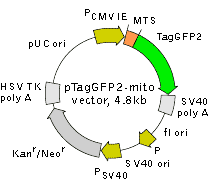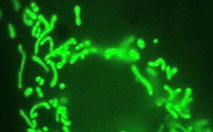
|
||||||||||
|
||||||||||

|
|
||||||||||||||||||||||||||||||||||||||||||||||||||||||
The vector sequence has been compiled using the information from sequence databases, published literature, and other sources, together with partial sequences obtained by Evrogen. This vector has not been completely sequenced. |
|||||||||||||||||||||||||||||||||||||||||||||||||
 Download
|
| ||||||||||||||||||||||||||||||||||||||||||||||||
Vector description
pTagGFP2-mito is a mammalian expression vector intended for green fluorescent labeling of mitochondria in living cells. The vector encodes green fluorescent protein TagGFP2 (see reporter description) fused to mitochondrial targeting sequence (MTS) derived from the subunit VIII of human cytochrome C oxidase [Rizzuto et al., 1989; Rizzuto et al., 1995]. MTS is fused to the TagGFP2 N-terminus.
 | Transiently transfected REF-52 cells expressing mitochondria-targeted TagGFP2. |
TagGFP2 codon usage is optimized for high expression in mammalian cells (humanized) [Haas et al., 1996].
pTagGFP2-mito vector can be used as a source of TagGFP2-MTS hybrid sequence. The vector backbone contains unique restriction sites that permit its excision and further insertion into expression vector of choice.
Note: The plasmid DNA was isolated from dam+-methylated
The vector backbone contains immediate early promoter of cytomegalovirus (PCMV IE) for protein expression, SV40 origin for replication in mammalian cells expressing SV40 T-antigen, pUC origin of replication for propagation in
SV40 early promoter (PSV40) provides neomycin resistance gene (Neor) expression to select stably transfected eukaryotic cells using G418. Bacterial promoter (P) provides kanamycin resistance gene expression (Kanr) in
Expression in mammalian cells
pTagGFP2-mito vector can be transfected into mammalian cells by any known transfection method. CMV promoter provides strong, constitutive expression of the TagGFP2-MTS fusion in eukaryotic cells. If required, stable transformants can be selected using G418 [Gorman, 1985].
Propagation in
Suitable host strains for propagation in
Location of features
PCMV IE: 1-589
Enhancer region: 59-465
TATA box: 554-560
Transcription start point: 583
TagGFP2-mito fusion
Start codon (ATG): 597-599
Mitochondrial targeting sequence (MTS): 597-683
Start of TagGFP2 coding sequence (ATG): 705-707
Stop codon: 1419-1421
SV40 early mRNA polyadenylation signal
Polyadenylation signals: 1574-1579 & 1603-1608
mRNA 3' ends: 1612 & 1624
f1 single-strand DNA origin: 1671-2126
Bacterial promoter for expression of Kanr gene
-35 region: 2188-2193
-10 region: 2211-2216
Transcription start point: 2223
SV40 origin of replication: 2467-2602
SV40 early promoter
Enhancer (72-bp tandem repeats): 2300-2371 & 2372-2443
21-bp repeats: 2447-2467, 2468-2488 & 2490-2510
Early promoter element: 2523-2529
Major transcription start points: 2519, 2557, 2563 & 2568
Kanamycin/neomycin resistance gene
Neomycin phosphotransferase coding sequences:
Start codon (ATG): 2651-2653
Stop codon: 3443-3445
G->A mutation to remove Pst I site: 2833
C->A (Arg to Ser) mutation to remove BssH II site: 3179
Herpes simplex virus (HSV) thymidine kinase (TK) polyadenylation signal
Polyadenylation signals: 3681-3686 & 3694-3699
pUC plasmid replication origin: 4030-4673
References:
- Gorman C. High efficiency gene transfer into mammalian cells. In DNA cloning: A Practical Approach, Vol. II. Ed. D. M. Glover. (IRL Press, Oxford, U.K.). 1985; 143-90.
- Haas J, Park EC, Seed B. Codon usage limitation in the expression of HIV-1 envelope glycoprotein. Curr Biol. 1996; 6 (3):315-24. / pmid: 8805248
- Rizzuto R, Brini M, Pizzo P, Murgia M, Pozzan T. Chimeric green fluorescent protein as a tool for visualizing subcellular organelles in living cells. Curr Biol. 1995; 5 (6):635-42. / pmid: 7552174
- Rizzuto R, Nakase H, Darras B, Francke U, Fabrizi GM, Mengel T, Walsh F, Kadenbach B, DiMauro S, Schon EA. A gene specifying subunit VIII of human cytochrome c oxidase is localized to chromosome 11 and is expressed in both muscle and non-muscle tissues. J Biol Chem. 1989; 264 (18):10595-600. / pmid: 2543673
Notice to Purchaser:
TagGFP2-related materials (also referred to as "Products") are intended for research use only. The Products are covered by U.S. Pat. 7,417,131; 7,605,230; 7,888,113; European Pat. 06809023; and other Evrogen Patents and/or Patent applications pending. By use of these Products, you accept the terms and conditions of the applicable Limited Use Label License.
|
Copyright 2002-2023 Evrogen. All rights reserved. Evrogen JSC, 16/10 Miklukho-Maklaya str., Moscow, Russia, Tel +7(495)988-4084, Fax +7(495)988-4085, e-mail:evrogen@evrogen.com |


